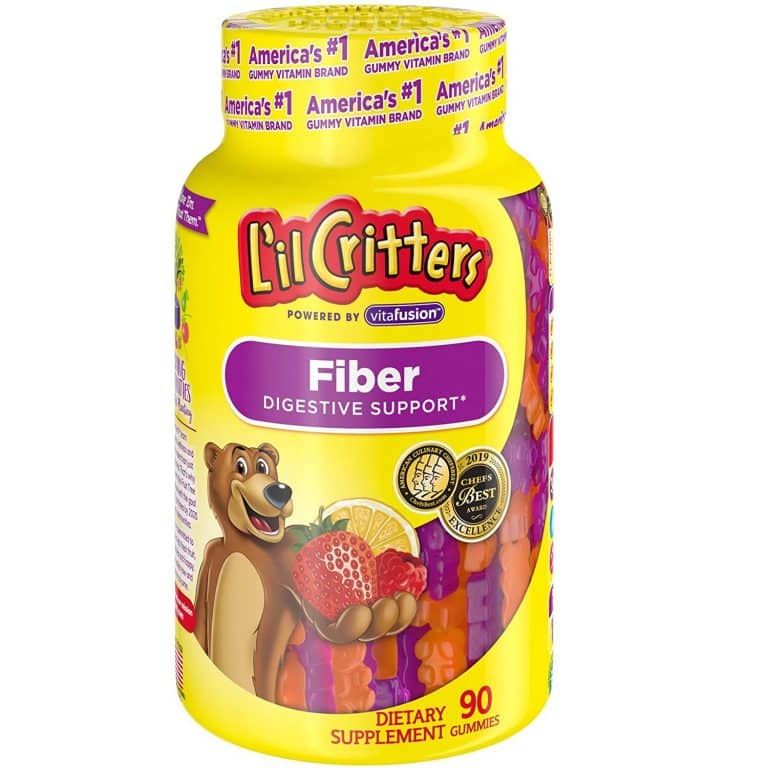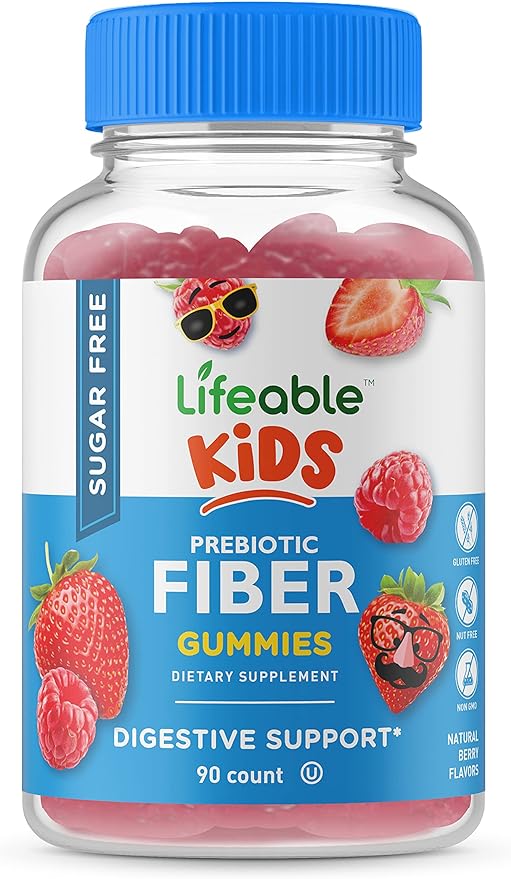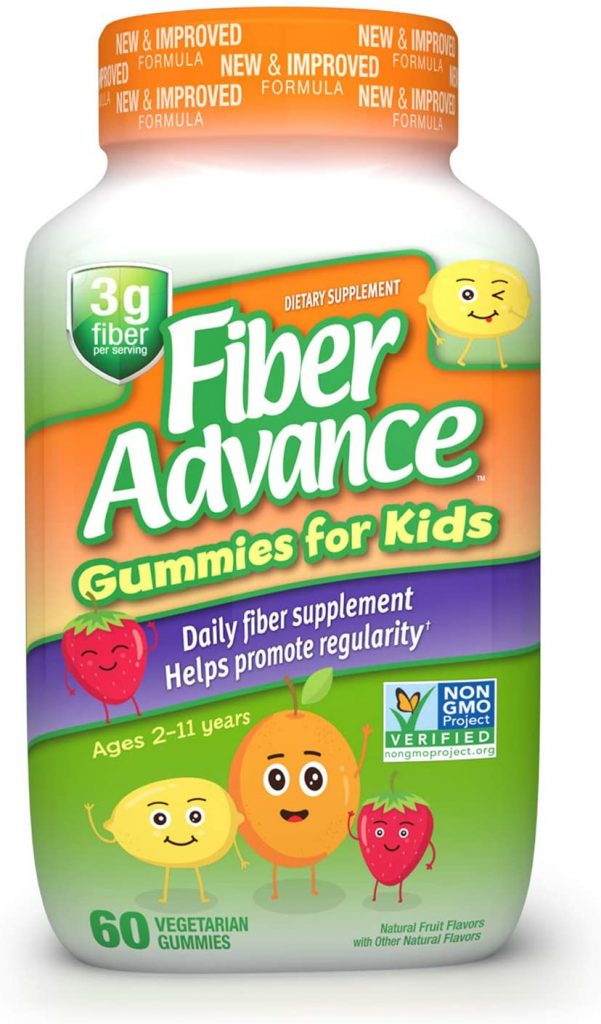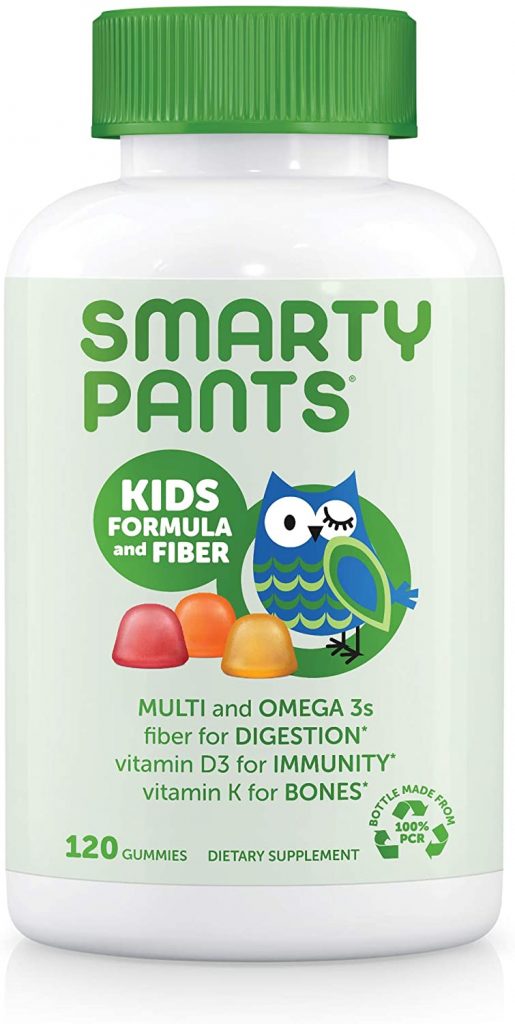Fiber is an essential part of any child’s diet and has many health benefits, but it can be tough to feed your kids a high-fiber diet.
Most kids are too fussy to eat natural sources of fiber like split peas, meaning many parents turn to supplements to give their kids the nutrition they need.
One of the best ways to combine essential nutrients with kid-friendly flavors is the best fiber gummies for kids, but can a sweet gummy give you the fiber you need for a healthy diet?
From regulating bowel movement to lowering your risk of diabetes and heart disease, fiber has a wide variety of health benefits and can be found in a variety of fruits and vegetables.
The best way to maintain healthy levels of fiber is through a balanced diet rich in whole grains, pulses, fruit, and vegetables, though this isn’t always possible, especially with kids.
Unfortunately, most Americans don’t meet the recommended daily intake of fiber (as much as 95% of the US population, according to some surveys), so chances are that you and your kids could use more fiber in your diet.
Even if you manage to feed your family plenty of fruit and vegetables, you could benefit from using fiber gummies for kids to bolster your fiber intake, so let’s take a closer look at these increasingly popular supplements.
Table of Contents
What is Fiber?

The term fiber refers to any type of carbohydrate that your body can’t digest, meaning they pass through most of your digestive system unchanged.
These carbs are then broken down by bacteria in your gut which contribute to your overall health, so eating plenty of fiber is essential for good gut health and by extension overall health.
Fortunately, fiber is common in fruits, vegetables, and pulses (such as pears, oats, and beans), so it’s easy to add fiber to your diet, though many people don’t eat the recommended daily intake of fiber.
Furthermore, since it can be tough to persuade kids to eat more fiber-rich foods, many parents are turning to fiber supplements – such as fiber gummies for kids – to give their children more of the essential nutrients they need, though there are doubts about the safety and effectivity of these supplements.
Best Fiber Gummies for Kids
We all want the best for our kids, so we’ve looked high and low to find the best fiber gummies for your kids, so you can ensure everyone in your family gets plenty of fiber, even if you can’t persuade the kiddies to eat their beans.
With that in mind, we’ve selected some of the best fiber gummies for kids on the market, focussing on 3rd party testing, fiber content, and additives to help you find a simple, effective way to boost your kids’s fiber intake.
1. L’il Critters Fiber Gummy Bears
With 3g of dietary fiber (about as much as 2 prunes) and no added sugar, these colourful gummy bears are a fun and tasty way to get more fiber into your kids diet without having to worry about giving them too much sugar.
2. Lifeable Sugar Free Prebiotics Fiber for Kids
These tasty fiber gummies for kids contain 4g of fiber per serving and are free of sugar, nuts, gluten, and gelatin, making them ideal for families with dietary needs like celiac disease.
3. Fiber Advance Kid’s Gummies
Made from all-natural (non-GMO), plant-based ingredients with 3g of fiber per serving, Fber Advance’s gummies come in three fun fruit flavors that even the pickiest kids will love.
4. SmartyPants Kids Formula and Fiber Daily Gummies
Unlike the other supplements on this list, SmartyPants’ fiber gummies for kids feature beta-carotene, Vitamin B6, Vitamin K2, and choline to support gut health, strong bones, and mental development, making them a great all-rounder multivitamin.
Do Fiber Gummies for Kids Actually Work?
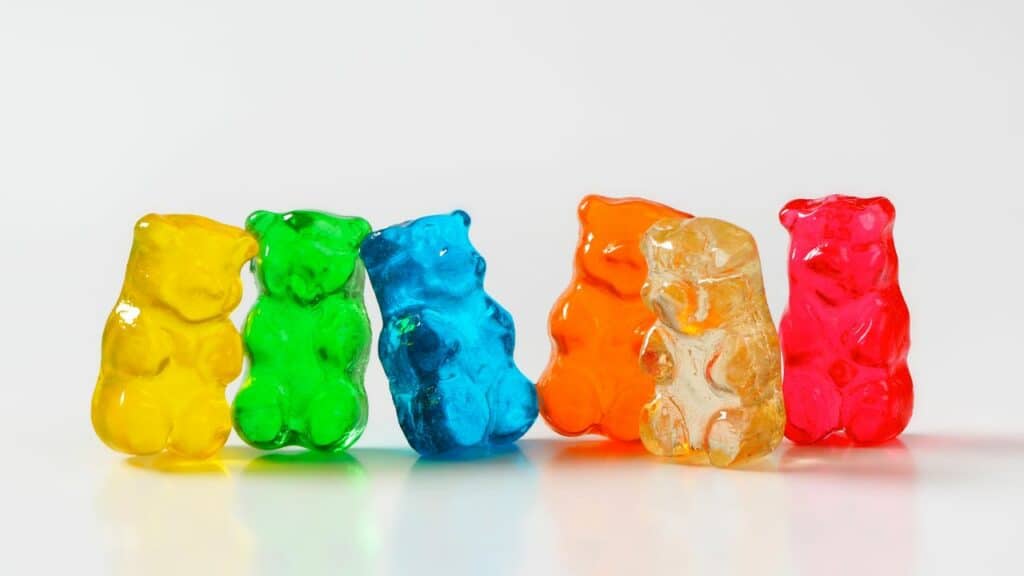
Asking whether or not fiber gummies ‘work’ is a complicated question, as people can mean all kinds of different things when they say “work”.
Will they work wonders on constipation? Absolutely.
Will they help you to get more fiber in your kids’ diet? You can bet your bottom dollar on it.
Are fiber gummies going to transform your life and leave you as regular as clockwork? Not necessarily.
It’s always best to get your fiber from a balanced diet high in fruit and vegetables, but this isn’t always feasible, so many people turn to supplements to ‘make up’ for missed nutrients.
In short, fiber gummies for kids don’t have anywhere near the nutritional value of a bowl of beans or fruit platter, but they’re a darn sight better than another plate of chicken nuggets, making them a valid way to get more essential nutrients in your kids’ diet.
Are Fiber Gummies Safe for Children?
There is currently no evidence suggesting that regular use of fiber supplements is harmful, though it’s best to get your fiber from whole foods, as they provide a wide variety of nutrients in addition to fiber.
While fiber supplements have been linked to minor side effects – like bloating and gas – they are not known to cause any serious health issues or long-term problems, so they are safe for children.
Furthermore, you can avoid most of these side effects by starting with smaller doses of fiber supplements and making sure your kids drink plenty of water, so stomach issues are nothing to worry about.
However, if your children have intestinal problems – such as Crohn’s disease or bowel blockages – then you should consult a doctor to see if fiber gummies for kids are suitable.
How Long Does It Take for Fiber Gummies to Work?
Fiber gummies are most effective at regulating your bowel movements and tackling constipation, and they get to work as soon as you ingest them. However, they can take anywhere between 12 and 24 hours to provide noticeable results.
Your body needs time to process the fiber content, meaning that you would be better suited to reach for a laxative if you need speedy relief.
But these supplements were never intended to serve as a quick fix, so you should stick with them if you want to see long-term results like improved gut health.
After a week or so on fiber gummies for kids, you should notice benefits like more regular bowel movements, reduced snacking (as soluble fiber promotes feelings of fullness), and maybe even improved mood, as your kids’ gut health improves.
Health Benefits of Fiber Gummies
As well as keeping your bowels moving, eating plenty of fiber has a wide range of health benefits that may surprise you, including:
Reducing Cholesterol
Having plenty of fiber in your digestive system can reduce the body’s cholesterol absorption, especially if you take statins already.
Promoting a Healthy Weight
High-fiber foods are lower in calories than processed foods and help you feel fuller for longer, supporting healthy dietary choices.
Reducing Constipation
Fiber helps to add bulk to your digestive tract and stimulate your intestines, so fiber gummies for kids could help with family cases of constipation.
Promoting Healthy Blood Sugar
High-fiber foods take longer for your body to break down, helping you maintain consistent blood sugar levels and avoid sugar rushes.
What Are the Side Effects of Fiber Gummies?

Although fiber is an extremely common, naturally occurring substance, it can cause adverse effects, especially when taken in larger doses than usual.
If you’re not used to a high-fiber diet, then you may notice some gastrointestinal discomfort such as bloating, gas, and constipation, though you can mitigate these symptoms by drinking plenty of water, and they should pass in a few days.
Fortunately, most fiber gummies for kids don’t contain enough fiber to cause serious discomfort, so make sure to increase your dose gradually, stay hydrated and you should be fine.
However, many gummy supplements contain high amounts of sugar (sometimes as much as 1g per gummy), meaning you run the risk of eating more sugar than is healthy for you.
RELATED: Read our article on Gummy Vitamins vs Pills to learn which form is best.
Are Fiber Gummies the Same as Metamucil?
Metamucil is a popular brand of fiber supplements that uses psyllium husk, a bulk-forming laxative, as the main active ingredient and offers fiber supplements in powder, capsule, and gummy forms.
Their gummies contain 2g of sugar per serving, making them less healthy than equivalent low-sugar or sugar-free fiber gummies, so they are far from an ideal substitute for a naturally high-fiber diet.
You should take care not to confuse Metamucil (a brand of fiber supplements) with fiber gummies in general, as there are lots of other options, many of which could be better for your health needs.
Conclusion
While fiber supplements are some of the safest types of supplements on the market (because fiber is such a ubiquitous nutrient in the first place), we recommend you ask your doctor for more advice before giving your kids fiber gummies regularly.
While they may seem like an easy shortcut to a balanced diet, fiber gummies for kids can contain high levels of sugar and other additives that undermine the health benefits they provide.

